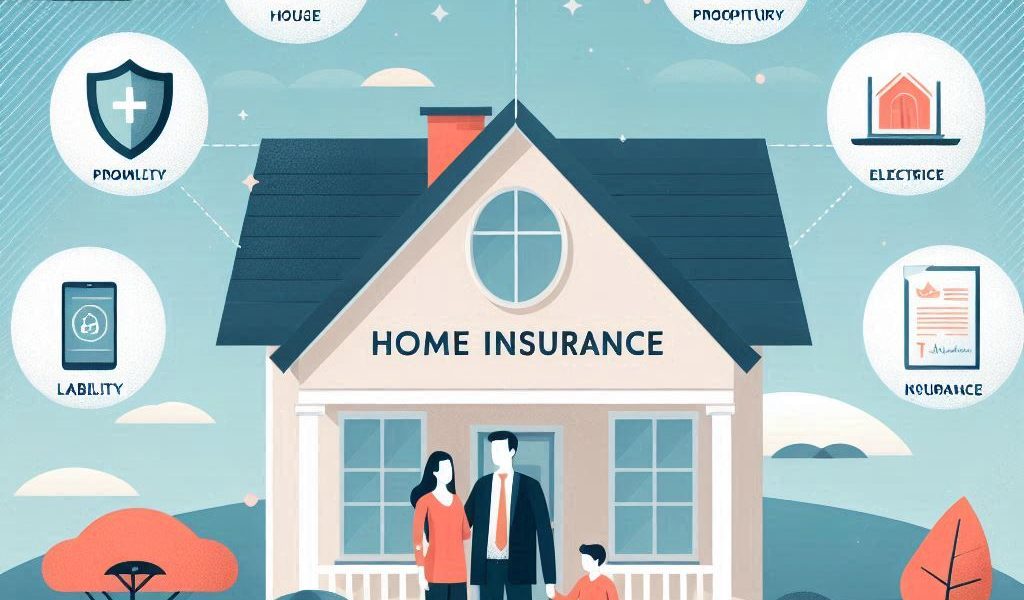Home insurance is one of the most essential forms of coverage for homeowners. Whether you’ve just purchased a new house or have owned one for years, understanding home insurance is crucial for protecting your investment. In this blog, we’ll break down the basics of home insurance, explain what’s covered, and help you understand why it’s important to have the right policy in place.
What Is Home Insurance?
Home insurance is a policy that provides financial protection in case your home is damaged or destroyed by covered events like fire, theft, or natural disasters. It also protects your personal belongings, liability, and sometimes even additional living expenses if you’re temporarily displaced due to damage.
While it’s not always required by law, most mortgage lenders require homeowners to have home insurance to protect the lender’s investment in the property.
Key Components of Home Insurance
A typical home insurance policy consists of several parts, each providing different types of coverage. Let’s break them down:
- Dwelling Coverage This covers the physical structure of your home, including the walls, roof, foundation, and built-in appliances. If your home is damaged or destroyed by a covered event, dwelling coverage helps pay for repairs or rebuilding costs.Example: If a fire damages your home’s roof or a tree falls on your house during a storm, dwelling coverage will help cover the repair or replacement costs.
- Personal Property Coverage Personal property coverage protects your belongings, such as furniture, electronics, clothes, and other items inside your home. If your belongings are stolen or damaged due to a covered event, this coverage helps you replace them.Example: If a break-in occurs and your electronics are stolen, personal property coverage will help you replace your TV, laptop, or other valuables.
- Liability Coverage Liability coverage helps protect you financially if someone is injured on your property or if you accidentally damage someone else’s property. This coverage helps with legal fees and medical costs if you are found legally responsible for an injury or damage.Example: If a guest trips and falls while visiting your home, liability coverage helps pay for their medical bills and any legal expenses if they sue you.
- Additional Living Expenses (ALE) Coverage If your home is uninhabitable due to a covered loss (e.g., fire or flood), ALE coverage will help pay for temporary living arrangements such as hotel stays, food, and transportation.Example: If your home is severely damaged by a storm and you need to stay in a hotel while repairs are made, ALE will cover the associated costs.
What Does Home Insurance Not Cover?
While home insurance provides comprehensive protection, there are some exclusions. Most standard policies do not cover the following:
- Flood Damage Home insurance typically doesn’t cover flooding caused by heavy rain, storm surges, or rising water. If you live in a flood-prone area, you may need to purchase additional flood insurance.
- Earthquakes Earthquakes are usually excluded from standard home insurance policies. If you live in an area prone to earthquakes, consider adding an earthquake endorsement to your policy.
- Maintenance Issues Home insurance covers damage caused by sudden and accidental events, but it doesn’t cover damage from lack of maintenance, such as mold growth or pest infestations.
- War or Nuclear Accidents Damage caused by acts of war, terrorism, or nuclear accidents is generally excluded from home insurance policies.
How Much Home Insurance Do You Need?
The amount of home insurance you need depends on several factors, including the value of your home and personal belongings. It’s important to insure your home for its full replacement cost, which is the amount needed to rebuild your home using similar materials and craftsmanship.
A common mistake many homeowners make is underinsuring their property, which can leave them with insufficient coverage in the event of a loss. To determine the right amount of coverage, consider the following:
- Replacement Cost of Your Home: This is the cost to rebuild your home from scratch, including labor and materials. It’s important to get an accurate estimate to ensure you’re not underinsured.
- Personal Property Valuation: Take an inventory of your belongings and estimate their value. This will help you determine how much personal property coverage you need.
- Liability Limits: Most policies include a standard liability limit, but you may want to increase it if you own valuable assets or host gatherings at your home.
How to Save on Home Insurance
While home insurance is essential, the good news is that there are several ways you can reduce your premiums without sacrificing coverage:
- Shop Around for Quotes: Different insurance companies offer different rates. It’s worth getting quotes from multiple providers to find the best deal.
- Increase Your Deductible: Increasing your deductible (the amount you pay out of pocket before insurance kicks in) can lower your premium. However, make sure you can afford the deductible in case you need to file a claim.
- Bundle Policies: If you have other insurance policies, such as auto or life insurance, consider bundling them with your home insurance provider. Many companies offer discounts for bundling.
- Improve Home Security: Installing a home security system or upgrading your home’s safety features (e.g., smoke detectors, fire extinguishers) can reduce your premium.
- Maintain a Good Credit Score: Insurance companies often use your credit score to determine your premium. Maintaining a good credit score can help lower your rates.
Why Home Insurance Is Important
Home insurance is essential because it protects you financially in case of unexpected events. Without it, you’d be responsible for the full cost of repairs or replacement if your home is damaged or destroyed. It also provides liability protection in case someone is injured on your property or if you accidentally damage someone else’s property.
In addition to safeguarding your home and belongings, home insurance gives you peace of mind knowing that you’re covered for a wide range of potential risks. Whether you experience a fire, a theft, or a natural disaster, home insurance ensures that you won’t face financial ruin.
Conclusion
Home insurance is an important investment that provides peace of mind and financial protection for homeowners. Understanding the key components, knowing what’s covered and excluded, and ensuring you have adequate coverage are essential steps in protecting your home and belongings. Whether you’re a first-time homeowner or have lived in your home for years, it’s never too late to evaluate your home insurance needs and make sure you’re properly covered.




